- Home
- »
- Medical Devices
- »
-
Diabetic Retinopathy Market Size And Share Report, 2030GVR Report cover
![Diabetic Retinopathy Market Size, Share & Trends Report]()
Diabetic Retinopathy Market Size, Share & Trends Analysis Report By Type (Proliferative DR, Non-proliferative DR), By Management (Anti-VEGF Therapy, Vitrectomy), And Segment Forecasts, 2024 - 2030
- Report ID: 978-1-68038-466-6
- Number of Pages: 120
- Format: Electronic (PDF)
- Historical Range: 2018 - 2022
- Industry: Healthcare
Diabetic Retinopathy Market Size & Trends
The global diabetic retinopathy market size was estimated at USD 8.9 billion in 2023 and is expected to grow at a compound annual growth rate (CAGR) of 6.43% from 2024 to 2030. Diabetes is a serious and growing problem globally, where the inefficiency of the pancreas to produce insulin results in increased blood glucose levels. Diabetic retinopathy (DR) is caused by damage to the blood vessels in the retina. This leads to blurred vision and vision loss in most cases. Thus, the rising prevalence of diabetes as well as blindness caused by it along with the growing geriatric population is a key factor anticipated to boost market growth. The market growth is further propelled by the increasing awareness of diabetes management and care and new product launches.
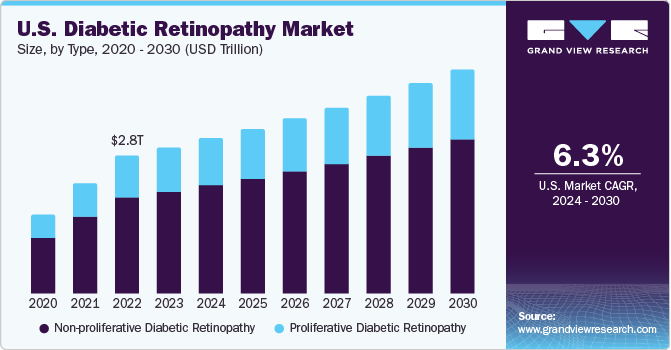
Diabetic retinopathy is a microvascular complication of type I and type II diabetes. It can progress to sight-threatening stages, which can cause blindness and visual impairment if not treated. According to a report published by the WHO, diabetic retinopathy is responsible for 4.8% of the 37 million blindness cases in the world. The prevalence of diabetic retinopathy in the U.S. is expected to increase rapidly. An estimated 4.1 million U.S. individuals aged 40 years and older, or 1 in 29, have diabetic retinopathy. An estimated 899,000 people in this demographic, or 1 in 132, have vision-threatening diabetic retinopathy. Despite all the necessary measures adopted by the diabetic population, diabetic retinopathy can lead to permanent blindness, based on the disease stage and severity of the condition.
Furthermore, according to an American Diabetes Association report, a diabetic person is at risk for diabetes-related eye diseases, such as cataracts, diabetic retinopathy, macular edema, and glaucoma. Diabetic retinopathy is a leading cause of blindness among U.S. adults. By 2030, the number of people with this eye disease will reach over 11 million. The prevalence of diabetic blindness and sight-threatening diseases increases in proportion to the duration of diabetes. Although most diabetic patients suffer from vision impairment, only 5% develop vision loss. The global diabetic population is expected to reach 700 million by 2045, implying that 35 million individuals may develop blindness due to diabetes, creating a major cause for concern.
Diabetic retinopathy is the leading cause of blindness in adults aged 20 to 70 years. According to the American Diabetes Association, up to 21% of type 2 diabetes patients had diabetic retinopathy at the time of their initial diabetes diagnosis, while the majority of them may develop diabetic retinopathy over time. According to a CDC analysis, early detection and treatment can prevent more than 90% of diabetes-related visual impairment cases. Intensive blood glucose management can reduce the risk of diabetic retinopathy by 27%. Therefore, the rising prevalence of blindness is expected to be one of the major growth drivers of the market.
Market Concentration & Characteristics
The market growth stage is medium, and the pace of the market growth is accelerating. The global diabetic retinopathy market has witnessed a significant degree of innovation, marked by regulatory approvals along with partnerships & collaborations. Market leaders face increased competition from new drug launches and new management treatment approval from regulatory bodies, making it difficult for them to sustain themselves in the ever-changing market. However, heavy investments in R&D conducted by market leaders are expected to boost market growth. For instance, in August 2023, Regeneron Pharmaceuticals, Inc. announced that the U.S. Food & Drug Administration (FDA) has approved EYLEA HD (aflibercept) Injection 8 mg for the treatment of patients with diabetic retinopathy (DR), diabetic macular edema (DME), and wet age-related macular degeneration (wAMD).
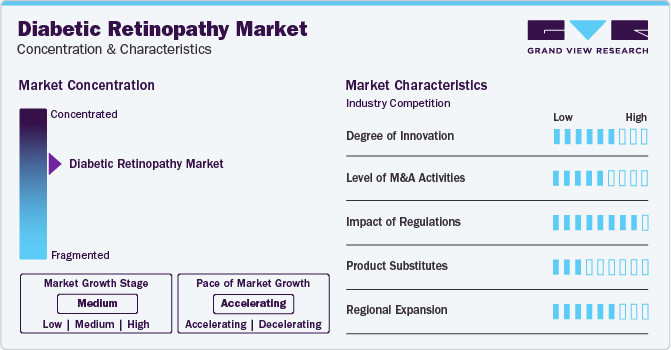
In addition, technological advancements and new product launches in the field of diabetic retinopathy are fueling market growth. For instance, in January 2023, The Ukrainian startup, Healthi developed an innovative AI solution to address DR. Healthi's AI technology utilizes machine learning (ML) algorithms to analyze retinal images and detect early signs of DR, enabling timely intervention and preventive measures. This advancement can revolutionize diabetic care by providing a cost-effective and efficient means of early diagnosis, ultimately improving the management of diabetic patients' eye health.
Degree of Innovation: The global market is characterized by a high degree of innovation owing to rapid technological advancements, and an increase in research and development activities. For instance, in November 2023, Ocuphire Pharma, a biopharmaceutical company focused on ophthalmic treatments, announced the positive outcome of its meeting with the U.S. FDA about oral APX3330 for the treatment of DR. The FDA has supported the advancement of the medication into Phase 3 studies based on the successful results of the recently completed Phase 2 ZETA-1 trial.
Level of M&A Activities:Prominent players in the market are involved in a moderate level of merger and acquisition (M&A) activities. This can be attributed to various factors, such as the need to acquire new product development facilities, enhance their capabilities, and expand their product portfolios.
Impact of Regulations: The market for diabetic retinopathy devices and drugs is subjected to regulatory scrutiny. Manufacturers and suppliers must comply with various regulations, including product development and clinical trials. In case of non-compliance with the regulations, the regulatory bodies may issue warnings against the companies.
Product Substitutes: Ongoing technological advancements in devices and continuous R&D efforts are expected to replace conventional products, such as laser therapy and corticosteroids, with newer alternatives, such as anti-VEGF injection and vitrectomy procedures.
Regional Expansion:Regional expansion is expected to have a moderate to high growth impact on the market. As a large number of end-users are adopting diabetic retinopathy devices for effective management, industry players are investing in regional expansion to increase manufacturing capacity. In addition to meeting the growing demand, regional expansion provides companies with an opportunity to tap into previously untapped customer bases. This strategy enables them to strengthen their position in the market and increase their market share.
Type Insights
The non-proliferative diabetic retinopathy (NPDR) segment dominated the market and accounted for the largest revenue share of 70.38% in 2023. The growing geriatric population and rising incidences of blindness caused by diabetes are the key factors accounting for its large share. NPDR, or background retinopathy, is a common diabetic eye condition and one of the leading causes of blindness in adults. It typically progresses from mild to moderate, leading to serious eye conditions. NPDR is primarily characterized by microaneurysms (microscopic blood-filled bulges in artery walls) that leak into the retina. Although non-proliferative retinopathy is not a vision-threatening condition, it may lead to diabetic macular edema (swelling in the macula), resulting in vision loss. With the growing severity of NPDR, the risk of developing vision-threatening proliferative diabetic retinopathy also increases.
The proliferative diabetic retinopathy (PDR) segment is expected to witness a significant CAGR from 2024 to 2030. Some of the key trends in the proliferative diabetic retinopathy market include the development of new drugs and therapies, the adoption of innovative diagnostic tools, and the expansion of healthcare infrastructure in emerging markets. In addition, there is a growing interest in the use of AI and ML to improve the accuracy of PDR diagnosis and treatment. PDR is an advanced stage of retinopathy where the delicate blood vessels grow inside the retina and the vitreous humor, resulting in blurred vision and blindness. It may lead to macular edema, showing no symptoms at the early stages. It is diagnosed through thorough eye checkups, such as visual acuity tests, tonometry, and many others. It is also treated with the help of laser surgery that allows shrinkage of blood vessels.
Management Insights
The anti-VEGF drugs segment captured the largest revenue share of 92.33% in 2023 due to the efficiency and efficacy of these drugs in the treatment of diabetic retinopathy. Anti-VEGF drugs are popularly used for the treatment of PDR. Anti-VEGF agents were found to be more beneficial in PDR, especially in cases with vitreous hemorrhage, neovascular glaucoma, and before the vitrectomy procedure. Anti-VEGF agents are injected into the eye to block the formation of weak blood vessels and slow down retinopathy progress. Currently, four major anti-VEGF agents—Eylea, Avastin, Lucentis, and Macugen—are available in the market. These agents were approved by the U.S. FDA in 2011 for the treatment of DME.
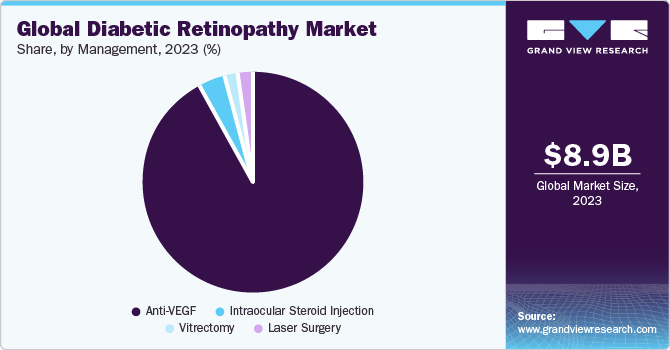
Intraocular steroidal injection is a new treatment for DME and diabetic retinopathy as compared to the anti-VEGF agents and is slowly gaining momentum. The injections contain corticosteroid-based drugs that control cellular proliferation. Among all corticosteroids being examined, Triamcinolone (Durezol) has shown the best therapeutic performance and has a strong market presence. Other segments include laser surgery and vitrectomy as retinopathy management tools. The increasing prevalence of PDR is expected to drive the growth of the intraocular steroidal injections market.
Regional Insights
North America captured the largest revenue share of 37.76% in 2023. The presence of sophisticated healthcare infrastructure, favorable government initiatives pertaining to drug development, and the presence of high patient & practitioner awareness levels are some of the factors driving market growth. High market penetration of novel products, such as anti-VEGF drugs, including Lucentis, Avastin, and Eylea, is one of the major factors contributing to the large share of this region. Some of the major drivers are high healthcare expenditure, increased awareness of diabetes, the presence of well-established healthcare infrastructure, and favorable reimbursement frameworks.
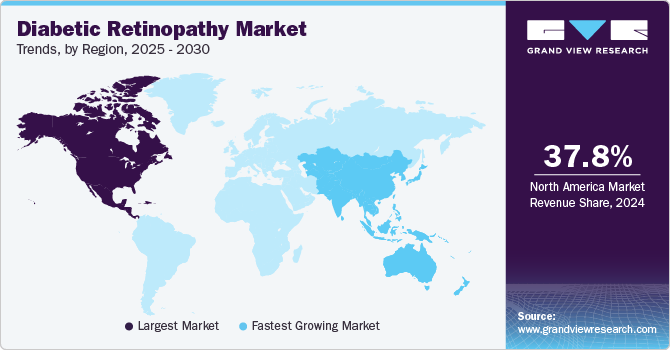
U.S. Diabetic Retinopathy Market Trends
The U.S. diabetic retinopathy market is expected to grow over the forecast period owing to the presence of major players, such as Genentech, Inc., AbbVie Inc., Alimera Sciences, and Ampio Pharmaceuticals. The favorable reimbursement scenario provides access to healthcare services to a large portion of the population. Subsequently, it creates a demand for cost-effective and efficient diabetes management devices. This also increases the need for cost-effective treatment and integration of digital health in the care delivery system. Hence, many companies are seeking U.S. FDA approval to launch their products in the U.S. market. For instance, in February 2023, Regeneron received FDA approval for powerhouse Eylea. This is for the treatment of the infant version of diabetic retinopathy.
Europe Diabetic Retinopathy Market Trends
The market in Europe is expected to grow at a lucrative CAGR during the forecast period due to the growing diabetic population and increasing awareness of the importance of managing and controlling the disease. The International Diabetes Federation report of 2021 states that around 61 million people in Europe suffer from diabetes, which is equivalent to approximately one in every 11 adults.
UK Diabetic Retinopathy Market Trends
Diabetic retinopathy is a major cause of blindness. According to a report by NHS Digital, the number of people with diabetes-related eye disease has increased by 5% in the UK in the last two years. The same report also highlights that diabetic retinopathy is more common in people with Type 1 diabetes, affecting around one in three people, compared to those with Type 2 diabetes, affecting around one in ten people. Also, the rising geriatric population is anticipated to boost the growth of the UK diabetic retinopathy market as the geriatric population is more susceptible to diabetes and related disorders.
Germany Diabetic Retinopathy Market Trends
The Germany diabetic retinopathy market is growing at a significant pace owing to the increased prevalence of diabetes disorder. Diabetes poses a significant health challenge for healthcare systems in Germany. The prevalence of type 1 & 2 diabetes in the adult population is high, with several patients remaining undiagnosed. The growing aging population and unhealthy lifestyle choices are expected to increase the prevalence of type 2 diabetes in the coming decade. Diabetic retinopathy is a significant health concern in Germany, affecting a large number of people. However, advancements in technology have led to the development of new and innovative treatments for this condition, including vitrectomy surgery.
France Diabetic Retinopathy Market Trends
The France diabetic retinopathy market growth is driven by major factors, such as growing incidence of diabetes & obesity, rising awareness of diabetic care, healthcare expenditure, and technological advancements. The French government has taken several initiatives to regulate the rising burden of diabetic retinopathy, such as increasing access to screening and treatment for diabetic retinopathy. These efforts have been aimed at reducing the incidence of the condition and improving the quality of life for those affected.
Asia Pacific Diabetic Retinopathy Market Trends
The Asia Pacific diabetic retinopathy market is expected to witness a lucrative CAGR of 7.06% from 2024 to 2030. This is majorly due to the fact that the Asia Pacific region is majorly driven by China and Japan. China dominated the overall Asia Pacific diabetic retinopathy market in terms of revenue share. This can be attributed to the presence of major players and the high prevalence of diabetes. In addition, technological advancements in diabetic retinopathy treatments, the increasing geriatric population, and the prevalence of lifestyle diseases, such as obesity, are anticipated to promote regional market growth.
China Diabetic Retinopathy Market Trends
China has the world's largest diabetic population, with an estimated 116 million adults living with the condition, according to the International Diabetes Federation. The prevalence of diabetes in China has been increasing rapidly in recent years due to changing lifestyles and a growing aging population, which is driving the China diabetic retinopathy market growth. In addition, there has been an increase in the number of people receiving regular eye exams and early detection of diabetic retinopathy, leading to a higher demand for treatment options.
Japan Diabetic Retinopathy Market Trends
The Japan diabetic retinopathy market has been experiencing steady growth owing to the rising number of diabetic patients and increasing awareness of the importance of early detection and treatment of DR. In addition, favorable government initiatives and reimbursement policies are expected to boost market growth. In addition, according to the Ministry of Internal Affairs and Communications, as of 2020, Japan has one of the largest geriatric populations in the world, with around 28% of its population aged 65 years or older. This demographic trend has led to an increase in the prevalence of age-related diseases, such as DR.
India Diabetic Retinopathy Market Trends
India currently has one of the largest diabetic populations in the world, with over 77 million individuals affected by the condition. Diabetic retinopathy is a leading cause of blindness in India, and nearly one-third of all diabetic patients have some degree of DR. To reduce the disease burden, the Indian government has implemented several initiatives, including the National Program for Control of Blindness & Visual Impairment (NPCBVI) and the National Program for Control of Diabetes. These programs aim to improve access to screening and treatment for DR, as well as raise awareness of the condition among affected individuals. Despite these efforts, the prevalence of diabetic retinopathy in India remains high, highlighting the need for continued action to prevent and manage this condition. Hence, the India diabetic retinopathy market is expected to witness significant growth in the forecast period.
Latin America Diabetic Retinopathy Market Trends
Latin America diabetic retinopathy market growth is being driven by the high prevalence of diabetes, and Mexico is recognized for having many patients with diabetes as type-2 diabetes is becoming prevalent. The genetic predisposition to type-2 diabetes and the steadily increasing obesity incidence have been major contributors to the increased prevalence of type-2 diabetes over the past 40 years. Approximately 10% of people worldwide currently live with diabetes. The Latin America diabetic retinopathy market growth is primarily driven by Brazil, Mexico, Argentina, and Colombia. Growing investments by market players in the region, proximity to North America, and free-trade agreements with major countries, such as the U.S., Canada, Japan, & several European countries, are among the factors anticipated to boost the market growth during the forecast period.
Middle East & Africa Diabetic Retinopathy Market Trends
The Middle East & Africa diabetic retinopathy market is expected to witness rapid growth due to the increased disease prevalence and growing geriatric population. According to the International Diabetes Federation (IDF), the Middle East accounted for the second-highest deaths due to diabetes among patients aged below 60 years. In addition, in 2021, the IDF estimated that the current 24 million population with diabetes across the region is expected to increase by 134% by 2045. Despite significant factors driving the penetration of digital patient monitoring devices, stringent regulatory framework and lack of proper reimbursement policies are anticipated to restrain the regional market growth.
Key Diabetic Retinopathy Company Insights
Major industry players are focused on enhancing their product offerings through product upgrades, strategic collaborations, and obtaining government approvals to expand their customer base and gain a greater share of the overall market. In addition, they are considering acquisitions as a potential growth strategy. For instance, in May 2023, Alimera Sciences announced its acquisition of further commercialization rights for YUTIQ (fluocinolone acetonide intravitreal insert) 0.18mg from EyePoint Pharmaceuticals, Inc. for the treatment of chronic non-infectious uveitis affecting the posterior portion of the eye.
Key Diabetic Retinopathy Companies:
The following are the leading companies in the diabetic retinopathy market. These companies collectively hold the largest market share and dictate industry trends. Financials, strategy maps & products of these diabetic retinopathy companies are analyzed to map the supply network.
- Bayer AG
- ABBVIE INC.
- Novartis AG
- Oxurion NV
- Sirnaomics
- Alimera Sciences
- Ampio Pharmaceuticals Inc.
- BCNPeptides
- Kowa Company Ltd.
- Genentech, Inc.
Recent Developments
-
In June 2023, Eyenuk received FDA clearance for its Topcon NW400 retinal camera with its EyeArt AI system for the autonomous AI detection of diabetic retinopathy
-
In January 2023, Eyenuk received European Union Medical Device Regulation (MDR) certification for its EyeArt AI eye screening system. This certification covers the detection of diabetic retinopathy, age-related macular degeneration, and glaucoma
Diabetic Retinopathy Market Report Scope
Report Attribute
Details
Market size value in 2024
USD 9.48 billion
Revenue forecast in 2030
USD 13.77 billion
Growth rate
CAGR of 6.43% from 2024 to 2030
Actual data
2018 - 2022
Forecast period
2024 - 2030
Report updated
February 2024
Quantitative units
Revenue in USD million and CAGR from 2024 to 2030
Report coverage
Revenue forecast, company ranking, competitive landscape, growth factors, and trends
Segments covered
Type, management, region
Regional scope
North America; Europe; Asia Pacific; Latin America; MEA
Country scope
U.S.; Canada; U.K.; Germany; France; Italy; Spain; Denmark; Norway; Sweden; India; Singapore; South Korea; China; Japan; India; Australia; Thailand; South Korea; Brazil; Mexico; Argentina; South Africa; Saudi Arabia; UAE; Kuwait
Key companies profiled
Bayer AG; Abbvie Inc.; Novartis AG; Oxurion NV; Sirnaomics; Alimera Sciences; Ampio Pharmaceuticals Inc.; BCNPeptides; Kowa Company Ltd.; Genentech, Inc.
Customization scope
Free report customization (equivalent up to 8 analyst’s working days) with purchase. Addition or alteration to country, regional, and segment scope
Pricing and purchase options
Avail customized purchase options to meet your exact research needs. Explore purchase options
Global Diabetic Retinopathy Market Report Segmentation
This report forecasts revenue growth at global, regional, and country levels as well as provides an analysis of the latest trends in each of the sub-segments from 2018 to 2030. For this study, Grand View Research has segmented the diabetic retinopathy market report on the basis of type, management, and region:
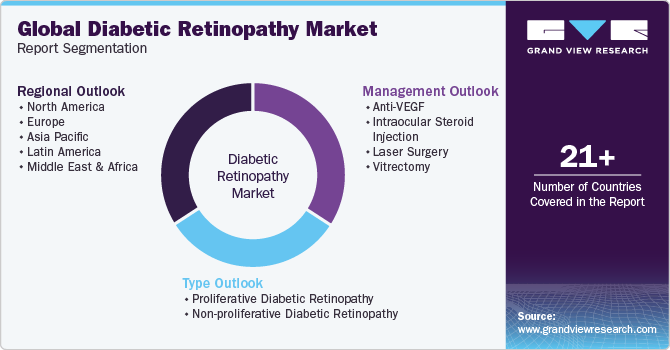
-
Type Outlook (Revenue, USD Million, 2018 - 2030)
-
Proliferative Diabetic Retinopathy
-
Non-proliferative Diabetic Retinopathy
-
-
Management Outlook (Revenue, USD Million, 2018 - 2030)
-
Anti-VEGF
-
Intraocular Steroid Injection
-
Laser Surgery
-
Vitrectomy
-
-
Regional Outlook (Revenue, USD Million, 2018 - 2030)
-
North America
-
U.S.
-
Canada
-
-
Europe
-
Germany
-
UK
-
France
-
Italy
-
Spain
-
Denmark
-
Sweden
-
Norway
-
-
Asia Pacific
-
Japan
-
China
-
India
-
South Korea
-
Thailand
-
Australia
-
-
Latin America
-
Brazil
-
Mexico
-
Argentina
-
-
Middle East & Africa
-
South Africa
-
Saudi Arabia
-
UAE
-
Kuwait
-
-
Frequently Asked Questions About This Report
b. The global diabetic retinopathy market size was estimated at USD 8.9 billion in 2023 and is expected to reach USD 9.48 billion in 2024.
b. The global diabetic retinopathy market is expected to grow at a compound annual growth rate of 6.43% from 2024 to 2030 to reach USD 13.77 billion by 2030
b. North America dominated the diabetic retinopathy market with a share of 37.8% in 2023. This is attributable to supportive reimbursement policies, and the increasing prevalence of diabetes.
b. Some key players operating in the diabetic retinopathy market include Bayer AG, Allergan plc, Novartis AG, Oxurion NV, Regeneron Pharmaceuticals Inc., ThromboGenics NV, Sirnaomics, Inc., Genentech, Glycadia Pharmaceuticals, Alimera Sciences, Ampio Pharmaceuticals, BCN Peptides, and Kowa Group.
b. Key factors that are driving the diabetic retinopathy market growth include the increasing prevalence of diabetes along with the growing incidence of blindness due to diabetes.
Share this report with your colleague or friend.
![gvr icn]()
NEED A CUSTOM REPORT?
We can customize every report - free of charge - including purchasing stand-alone sections or country-level reports, as well as offer affordable discounts for start-ups & universities. Contact us now
![Certified Icon]()
We are GDPR and CCPA compliant! Your transaction & personal information is safe and secure. For more details, please read our privacy policy.
We are committed towards customer satisfaction, and quality service.
"The quality of research they have done for us has been excellent."





